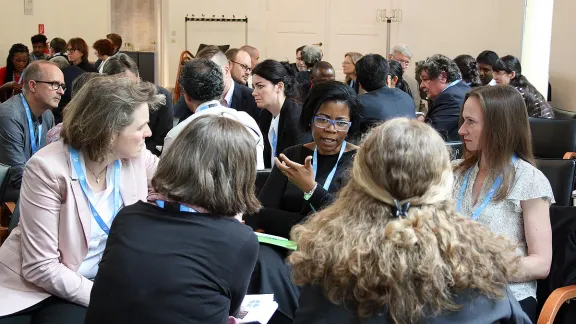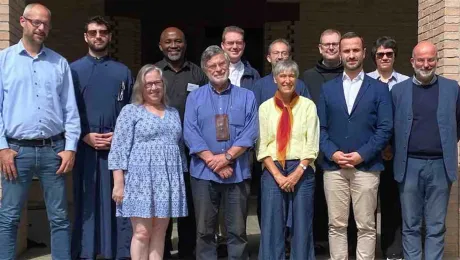
Pröpstin Astrid Kleist (left ) and Prof. Dr Puleng LenkaBula (center) in discussion during the conference in Berlin. Photo: LWF/ A. Weyermüller
Global conference encourages churches to engage critically with exclusionary populism
(LWI) - „May God bless us with the feeling of being uncomfortable when the answers become too easy,” Singo Maibongwe from the United Theological College Harare in Zimbabwe prayed during a morning devotion of the conference “Churches as Agents for Justice and against Populism” which was held in Berlin, Germany from 2 to 4 May.
“Exclusionary populism can be understood as a symptom of the crisis of democracy and unjust economic systems, as well as a factor contributing to the crisis,” reads the summary of major findings from the conference. “In Europe, ethno-nationalist populist movements are a threat to the functioning of democratic principles in society. They make use of democratic processes to subvert and destroy essential preconditions and values on which democracy depends. […] Where hate speech, fake news, and methods of shallow propaganda enter the center stage of political discourse, the space for solid and serious democratic negotiation is severely narrowed.”
In Europe, ethno-nationalist populist movements are a threat to the functioning of democratic principles in society. They make use of democratic processes to subvert and destroy essential preconditions and values on which democracy depends.
The conference brought together 65 theologians, ethicists, church leaders, social and political scientists from 25 countries to critically analyze these developments, including how religious motives are used in populist movements. Furthermore, they discussed the role of theology and the church in responding to these challenges.
Populists use religion for exclusionary politics
“Populism is a flexible ideology which can go together with other ideologies and other regimes,” says Prof. Dr András Bozóki, Professor of Political Science at the Central European University in Budapest, Hungary. Analyzing his context, he points out how populism is combined with an ethno-nationalist agenda and an authoritarian political approach. Populist leaders claim to defend “the people” against others.
“Populism needs enemies to homogenize the nation,” Bozóki explains. In Hungary, Islamophobia is evoked by populist parties to gain votes even though there are very few Muslims in the country, he said. “Ethno-nationalist populist movements think that they can use Christianity for their own political purposes.”
Presentations from other countries showed similarities and differences in other contexts. “The biggest expression of populism in India today is that of Hindutva,” Rev. Dr Roger Gaikwad, General Secretary of the National Council of Churches in India, said. The ideology seeking to establish the hegemony of Hindus and the Hindu way of life also manifests as a political movement advocating for establishment of India as a Hindu state. “Hindutva deploys elements of religious fundamentalism, communalism and nationalism”, he added.
Challenged democracies
Conference participants engaged in a lively discussion on how the experience of economic inequalities is connected to the current political discourse. Tackling the problem of unjust distribution of power, wealth, social representation and political participation was seen as an urgent need to build trust in democratic structures and procedures. Prof. Dr Puleng LenkaBula, Deputy Director for Institutional Change, Student Affairs and Community Engagement at the University of the Free State in South Africa points out that in her country the “promises of democracy following the Apartheid regime” could not be fulfilled for all parts of society. Access to education and the distribution of wealth remain challenges.
Conference participants encouraged churches and theological institutions “to learn about the root causes of injustice, reclaim agency for justice and give prophetic witness against oppressive, exclusionary systems and structures.” The conference summary encouraged, “to critically remember where church and theology have been complicit in ethno-nationalist populist agendas and pointed to the need for repentance.”
Churches offering vision and global communion
“In a globalized world we cannot just ward off strangers and strangeness,” argued Pröpstin Astrid Kleist from the Evangelical Lutheran Church in Northern Germany. “On the contrary, churches can play an important role in articulating the message of reconciliation. This counteracts tendencies of homogenization.” She gave examples from Hamburg where the Lutheran church intentionally promotes intercultural openness in its kindergartens and educational institutions, and engages in interreligious dialogue to foster relationships.
Archbishop Dr Antje Jackelén from Church of Sweden underlined that the church needs to see “beyond the short-sighted and reactive politics in societies and act steadfastly as a holder of visions.” She highlighted the importance of being a church as part of a global communion of churches, transcending boundaries of ethnicity and nation.


